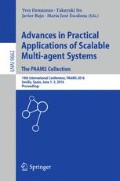Abstract
Theoretical frameworks have been developed for enabling software agents to evaluate simple activities such as walking and sitting. However, such frameworks typically do not include methods for how practically dealing with uncertain sensor information. We developed an argument-based method for evaluating complex goal-based activities by adapting two qualifiers: Performance and Capacity defined in the health domain. The first one evaluates what a person does, and the second one how “well” or “bad” an activity is executed. Our aim is to deal with uncertainty and inconsistent information; generate consistent hypotheses about the activity execution; and resemble an expert therapist judgment, where an initial hypothesis assessment can be retracted under new evidence. We conducted a pilot test in order to evaluate our approach using a Physiotherapy assessment test as a goal-based activity. Results show that skeptic argumentation semantics are may be useful for discriminating individuals without physical issues by considering Performance and Capacity; conversely, credulous semantics may be suitable for obtaining information in the evaluation of activity, which an intelligent agent may use for providing personalized assistance in an ambient assisted living environment.
Access this chapter
Tax calculation will be finalised at checkout
Purchases are for personal use only
Notes
- 1.
Actions have goals and are executed by a human agent at a conscious level, in contrast with operations which do not have a goal of their own and which are executed at the lowest level as automated, unconscious processes.
- 2.
In argumentation literature, a set \( S \subseteq P\) is consistent iff \( \not \exists \psi ,\;\phi \in P\) such that \( \psi = \lnot \phi \), Definition 6. Consistent set in [4].
References
Aggarwal, J.K., Ryoo, M.S.: Human activity analysis: a review. ACM Comput. Surv. (CSUR) 43(3), 16 (2011)
Baroni, P., Giacomin, M.: Skepticism relations for comparing argumentation semantics. Int. J. Approx. Reasoning 50(6), 854–866 (2009)
Besnard, P., Hunter, A.: A logic-based theory of deductive arguments. Artif. Intell. 128(1–2), 203–235 (2001)
Caminada, M., Amgoud, L.: On the evaluation of argumentation formalisms. Artif. Intell. 171(5), 286–310 (2007)
Chen, L., Hoey, J., Nugent, C.D., Cook, D.J., Yu, Z.: Sensor-based activity recognition. IEEE Trans. Syst. Man Cybern. Part C Appl. Rev. 42(6), 790–808 (2012)
Crocker, L., Algina, J.: Introduction to Classical and Modern Test Theory. ERIC, Princeton (1986)
Dung, P.M.: On the acceptability of arguments and its fundamental role in nonmonotonic reasoning, logic programming and n-person games. Artif. Intell. 77(2), 321–357 (1995)
Dung, P.M., Thang, P.M.: Closure and consistency in logic-associated argumentation. J. Artif. Intell. Res. 49, 79–109 (2014)
Gelfond, M., Lifschitz, V.: Classical negation in logic programs and disjunctive databases. New Gener. Comput. 9(3–4), 365–385 (1991)
Guerrero, E., Nieves, J.C., Lindgren, H.: Semantic-based construction of arguments: an answer set programming approach. Int. J. Approximate Reasoning 64, 54–74 (2015)
Kakas, A.C., Kowalski, R.A., Toni, F.: Abductive logic programming. J. Logic Comput. 2(6), 719–770 (1992)
Leont’ev, A.N.: Activity, Consciousness, and Personality. Prentice-Hall, Englewood Cliffs (1978)
Lindgren, H., Surie, D., Nilsson, I.: Agent-supported assessment for adaptive and personalized ambient assisted living. In: Corchado, J.M., Pérez, J.B., Hallenborg, K., Golinska, P., Corchuelo, R. (eds.) Trends in Practical Applications of Agents and Multiagent Systems. AISC, vol. 90, pp. 25–32. Springer, Heidelberg (2011)
Nieves, J.C., Guerrero, E., Lindgren, H.: Reasoning about human activities: an argumentative approach. In: Twelfth Scandinavian Conference on Artificial Intelligence, SCAI 2013, Aalborg, Denmark, 20–22 November, 2013, pp. 195–204 (2013)
Nute, D.: Defeasible logic. In: Bartenstein, O., Geske, U., Hannebauer, M., Yoshie, O. (eds.) INAP 2001. LNCS (LNAI), vol. 2543, pp. 151–169. Springer, Heidelberg (2003)
World Health Organization. How to use the ICF: A practical manual for using the International Classification of Functioning, Disability and Health (ICF). WHO (2013)
Peterson, B.D.: International classification of functioning, disability and health: an introduction for rehabilitation psychologists. Rehabil. Psychol. 50(2), 105 (2005)
Pollock, J.L.: Defeasible reasoning. Cogn. Sci. 11(4), 481–518 (1987)
Silfverskiöld, M.: Development and validation of an application for mobile phone with a self-test of standing up from a chair. Master’s thesis, Umeå University, Physiotherapy Department (2015, to appear)
Van Gelder, A., Ross, K.A., Schlipf, J.S.: The well-founded semantics for general logic programs. J. ACM 38(3), 619–649 (1991)
Acknowledgment
The authors are grateful to the participants in the user studies and to Marianne Silfverskiöld who conducted the case study. Silfversköld’s study was approved by the ethical committee (2014/113-31Ö).
Author information
Authors and Affiliations
Corresponding author
Editor information
Editors and Affiliations
Rights and permissions
Copyright information
© 2016 Springer International Publishing Switzerland
About this paper
Cite this paper
Guerrero, E., Nieves, J.C., Sandlund, M., Lindgren, H. (2016). Activity Qualifiers in an Argumentation Framework as Instruments for Agents When Evaluating Human Activity. In: Demazeau, Y., Ito, T., Bajo, J., Escalona, M. (eds) Advances in Practical Applications of Scalable Multi-agent Systems. The PAAMS Collection. PAAMS 2016. Lecture Notes in Computer Science(), vol 9662. Springer, Cham. https://doi.org/10.1007/978-3-319-39324-7_12
Download citation
DOI: https://doi.org/10.1007/978-3-319-39324-7_12
Published:
Publisher Name: Springer, Cham
Print ISBN: 978-3-319-39323-0
Online ISBN: 978-3-319-39324-7
eBook Packages: Computer ScienceComputer Science (R0)

